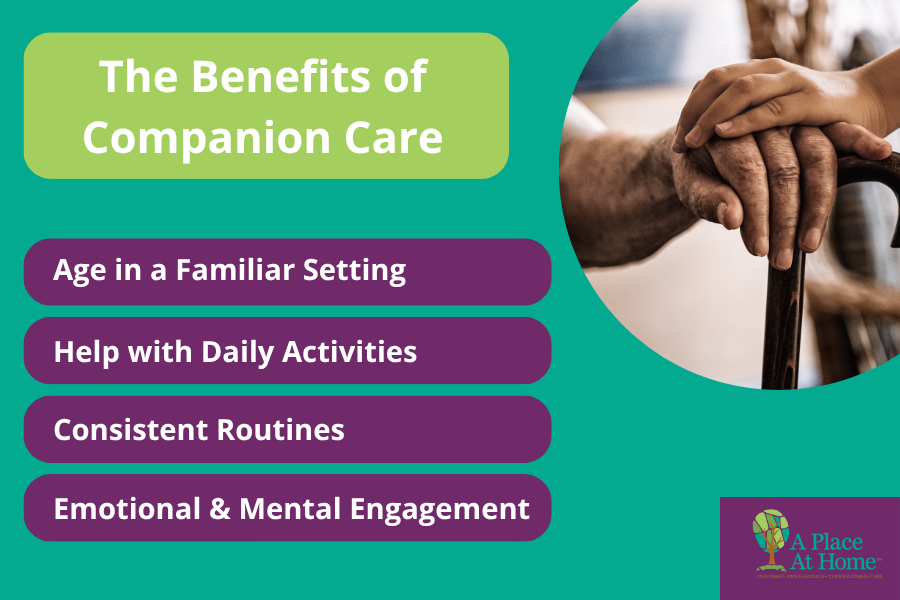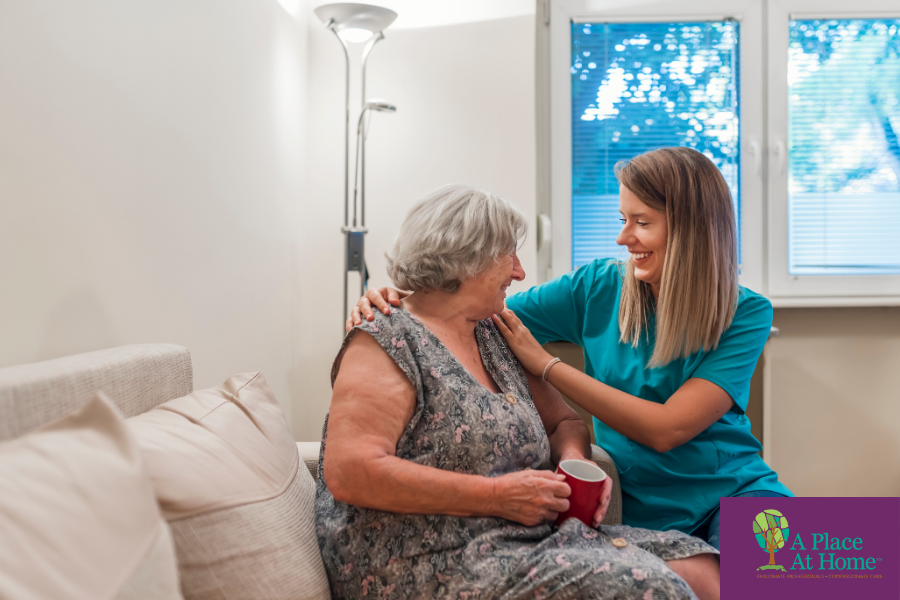
Older adults who struggle with loneliness benefit from a reliable source of companionship. One form of support is companion care, designed to keep the elderly socially engaged and active, crucial components to quality of life. For families in Palmetto, FL, companion care services provide compassionate social support that enhances seniors’ mental well-being and helps them age comfortably at home.
In this blog, we explore what companion care includes, how it differs from personal care, and how families in Manatee County and surrounding areas can benefit. Below is an exploration of the range of services and benefits it provides.
What Is Companion Care for the Elderly?
Companion care is a type of non-medical senior support that helps aging individuals avoid the emotional decline that can come with loneliness and social isolation. Companion caregivers provide friendly conversation, engage in hobbies, and assist with light activities that help seniors remain safe and emotionally fulfilled at home.
These caregivers often form strong bonds with their clients, offering essential social support while also assisting with instrumental activities of daily living (ADLs), like transportation, light housekeeping, and meal preparation. This service is especially valuable for seniors in Palmetto who live alone, are no longer driving, or have limited mobility.
What Is the Difference Between Companion Care and Personal Care?
Families often wonder whether they need companion care or personal care for their elderly loved one. The key difference lies in the type of assistance provided.
- Companion Care: Offers emotional support, social interaction, light housekeeping, and non-medical tasks.
- Personal Care: Involves hands-on help with activities of daily living (ADLs) like eating, bathing, toileting, dressing, and walking.
For seniors who are mostly independent but feel lonely or need help with errands and routines, companion care is often the ideal solution. If your loved one requires more physical assistance, consider personal care services instead.
What Are the Benefits of Elderly Companion Care?

The benefits of elderly companion care go far beyond socialization. This home care service allows older adults to:
- Age in place in a familiar and comfortable home setting
- Stay emotionally and mentally engaged through daily interaction
- Maintain a consistent routine with the help of a reliable caregiver
- Receive help with errands, appointments, and meal prep
- Enjoy peace of mind knowing someone is there to check on them
For seniors in Palmetto, Bradenton, Ellenton, and nearby communities, companion care is a cost-effective and meaningful way to enhance emotional well-being and safety at home.
How Do I Know If My Parent Needs a Companion Caregiver?
Aging parents living alone and struggling with loneliness or social isolation can greatly benefit from companion care. Seniors who are homebound due to mobility challenges receive valuable social support from a companion caregiver. Additionally, companion care is an excellent option for elderly individuals who wish to age in place comfortably and with dignity.
What Services Are Included in Companion Care?
A companion caregiver’s primary role is to provide emotional support, which is done through meaningful conversations and building strong bonds with seniors. They also engage in recreational activities, joining older adults in hobbies like games or crafts to bring joy and connection. The services provided by a companion caregiver fall into three key categories:
1. Emotional and Social Support
- Friendly conversation and companionship
- Participation in hobbies like games, puzzles, music, and crafts
- Support with email and social media to help seniors stay connected
2. Practical Assistance
- Transportation to doctor’s appointments, grocery stores, or events
- Light housekeeping and organizing
- Medication reminders
- Meal planning and healthy meal preparation
- Running errands and shopping
3. Safety Monitoring and Emergency Support
- Watching for signs of cognitive or physical decline
- Reporting concerns to family or healthcare providers
- Responding appropriately in emergencies, such as falls
These services are tailored to each individual’s lifestyle and preferences, allowing seniors to live comfortably and confidently in their homes.
Who Can Benefit from Companion Care?
As mentioned, socially isolated seniors benefit immensely from the compassionate care and attention given by companion caregivers. Older people with mobility issues who experience difficulty traveling to social events also find value in the transportation services provided by companion care.
Seniors with mild cognitive decline enjoy pleasant conversations with companion caregivers, who are trained to communicate effectively with aging care recipients. Adults with disabilities who need non-medical help find the ongoing emotional support from companion caregivers to be rewarding.
Recovering from a surgery or illness at home can be an isolating experience without a companion caregiver to serve as a social outlet. Not only does the caregiver engage socially as the senior remains on bed rest, but they also provide practical services, from picking up groceries to doing laundry.

How Much Does Companion Care Cost and Is It Covered by Insurance?
The cost of companion care varies based on geographic location and how many hours the caregiver works. Here is a general guide to companion care costs:
- National average daily rate: $125
- Monthly average: $3,813
- Hourly rate: Around $20
In Palmetto, FL, seniors who live with family may only need a few hours of care per day or week. Others may require more frequent support. Home care agencies like A Place At Home – Palmetto offer flexible scheduling based on your needs.
Insurance coverage:
- Medicare typically does not cover companion care
- Medicaid waivers in Florida may offer assistance
- Private insurance may offer partial coverage
How to Choose the Right Companion Care Provider
The right companion caregiver is a big contributor to the senior’s overall quality of life. Here are tips to choose a trustworthy provider:
- Use reputable home care agencies in Palmetto that screen and train caregivers
- Ask if the caregiver is licensed, bonded, and insured
- Make sure services match your loved one’s specific needs
- Look for providers experienced in companion care for seniors with dementia or physical limitations
- Read reviews and ask for references from other families in the area
If you are considering elderly companion care for yourself or a loved one, check your local Area Agency on Aging. Choose a home care agency that provides services that align with the older person’s care needs and goals. Learn the various services offered to ensure the senior receives the right support. Home care agencies are among the most trusted sources of care, as they vet and screen their professionals.
Get Started with Reliable Companion Care in Palmetto, FL
Don’t let loneliness reduce your aging loved one’s quality of life. Reliable companion care is available from trusted home care agencies, like A Place At Home – Palmetto. Our dedicated companion caregivers promote the social well-being of older adults in our care via a variety of means.
Our caring team loves forming real connections with seniors. We spend time chatting, playing games, and doing crafts together, helping them enjoy their favorite hobbies. For those who aren’t tech-savvy, we’re here to help with emails and social media, keeping them connected to family and friends.
FAQs About Senior Companion Care:
What tasks does a companion caregiver handle?
A companion caregiver handles a variety of tasks that support a senior’s emotional well-being and daily routine. These tasks often include engaging in conversation, playing games, helping with hobbies, and offering companionship during meals or downtime. The caregiver may also help prepare light meals, run errands, drive the senior to appointments, and provide reminders to take medications. In addition, they help with light housekeeping such as doing laundry, washing dishes, or organizing personal items. While they do not provide medical care, they monitor the senior’s overall well-being and communicate any concerns to family members.
What is the difference between companion care and caregiver?
The difference between companion care and caregiver lies in the type and level of support provided. A caregiver is a general term for someone who assists an older adult with daily needs, while companion care refers specifically to non-medical, emotional, and social support. Companion care focuses on reducing loneliness and helping with light tasks like conversation, meal prep, and errands. On the other hand, some caregivers provide personal care, which includes physical assistance with bathing, dressing, or mobility. In other words, companion care is one type of caregiving that emphasizes emotional connection and independence, whereas caregiving can also include more hands-on help depending on the situation.





